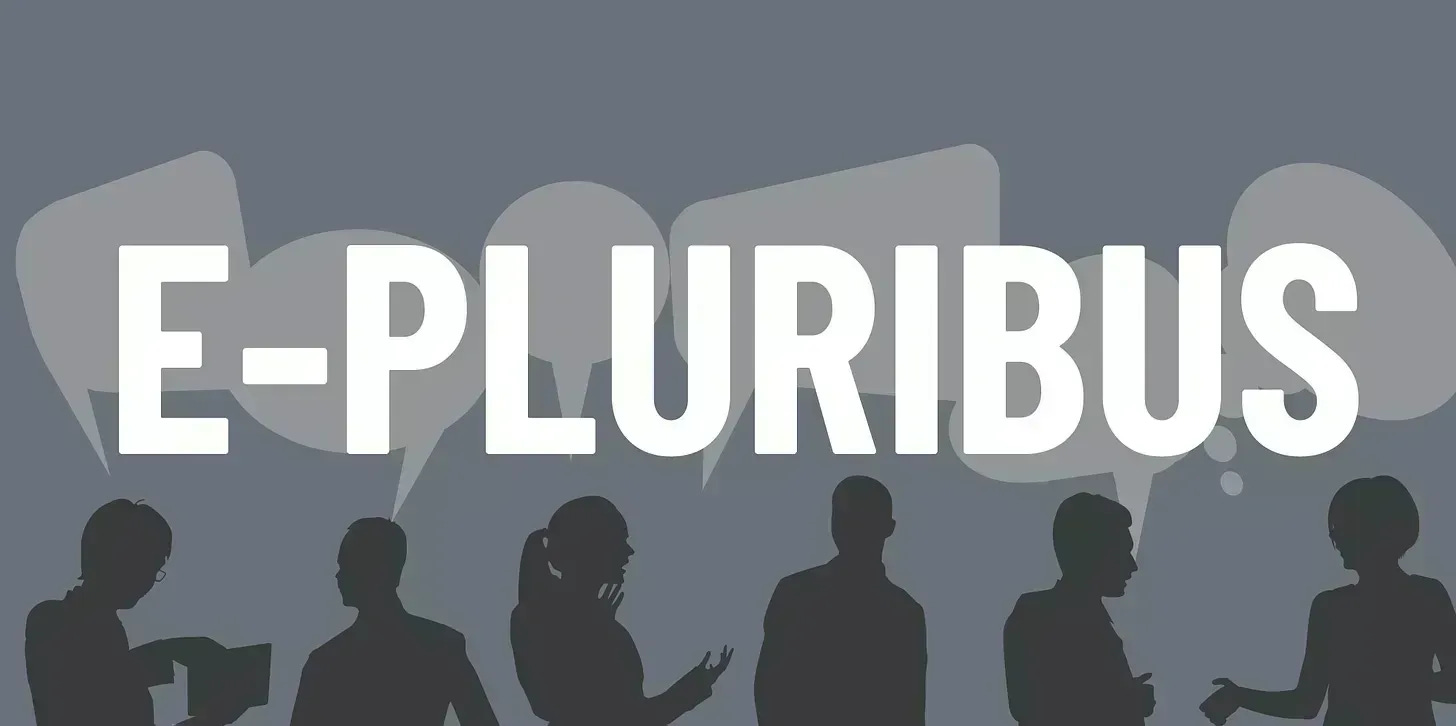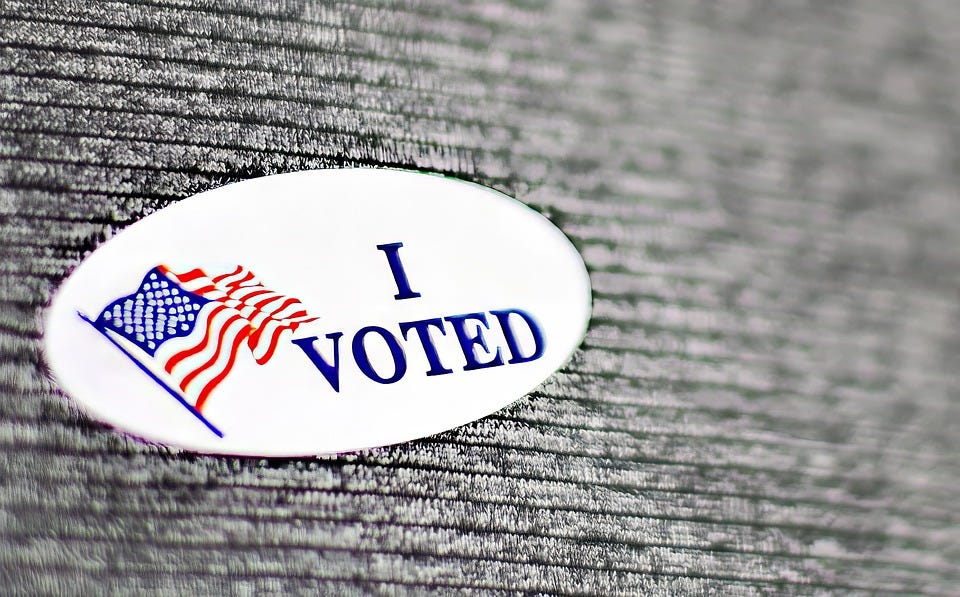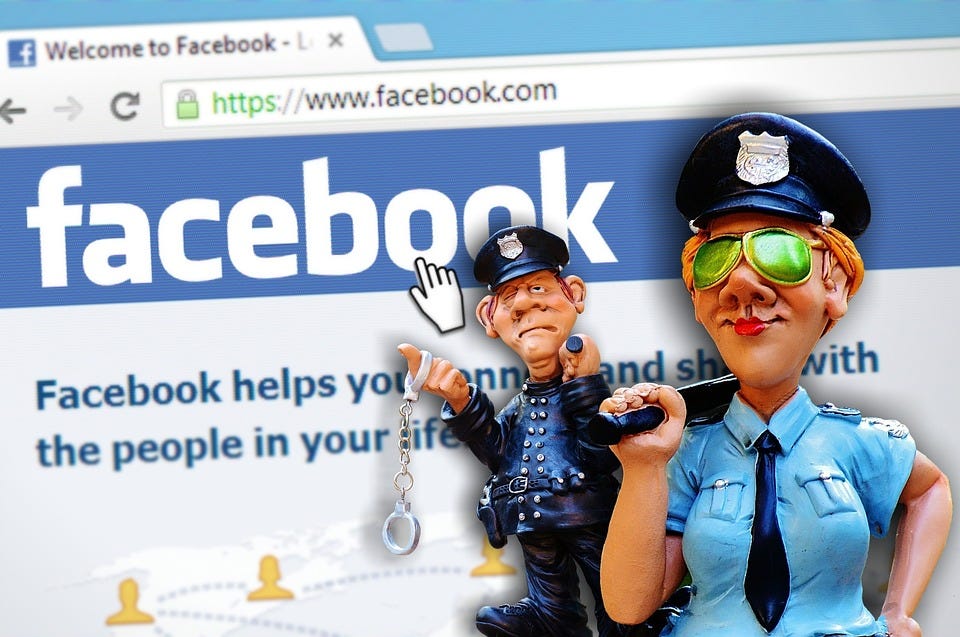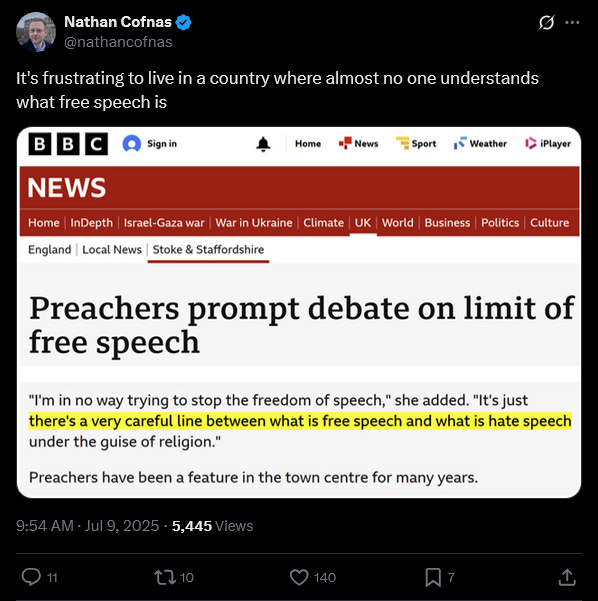E-Pluribus |July 10, 2025
Posting memes is still legal. Europe's speech crackdown. Social media warning labels erode civil liberties.
A round-up of the latest and best musings on the rise of illiberalism in the public discourse:
John Annese: Election interference conviction of pro-Trump Twitter troll Douglass Mackey overturned
In 2016, Douglass Mackey posted fake ads on Twitter telling Hillary Clinton supporters they could vote in the presidential election by text message. He was convicted of election interference in 2023, but a federal appeals court just overturned his conviction, finding the government failed to substantiate its charges. In other words, posting memes is not a federal offense for the time being. New York Daily News has the story:
A federal appeals court has overturned the criminal conviction of pro-Trump-right Twitter troll Douglass Mackey, who posted fake ads telling Hillary Clinton supporters they could vote in the 2016 election by text message.
Mackey was convicted in March 2023 of election interference, after a Brooklyn Federal Court found, after five days of fraught deliberation, finding him guilty of conspiracy against rights.
On Wednesday, a three-judge Second Circuit Court of Appeals ruled that prosecutors didn’t present sufficient evidence he had entered into any sort of conspiracy when he posted several meme images on Twitter, and that his presence in online chat rooms didn’t prove he was working with others.
“To begin, the government presented no evidence that Mackey participated in the conspiracy’s formation,” Chief Judge Debra Ann Livingston wrote in the 41-page decision. “Notably absent from this evidence was a single message from Mackey in any of these direct message groups related to the scheme.”
Natasha Dangoor, Bertrand Benoit, Max Colchester: Europe’s Crackdown on Speech Goes Far and Wide
Americans are fortunate to have courts and a constitution that protect our right to speak. Sadly, the same can’t be said in Europe. As the Wall Street Journal reports, the European Union has much more latitude to punish speech it doesn’t like, and critics anticipate the situation will only get worse in the coming years:
While the U.S. First Amendment stipulates that Congress “shall make no law” to restrict free speech, and hate speech is generally protected, governments aren’t so constrained in Europe. In a continent scarred by the Holocaust, loosely defined hate-speech laws and the rise of social media have created fertile ground for authorities to crack down on those seen to be stirring up trouble. Rarely a week goes by without a tale of zealous policing.
A German right-wing journalist posted a fake image online of the interior minister holding a sign that read “I hate freedom of opinion” and was subsequently handed a seven-month suspended prison sentence. A woman who posted images of politicians with painted-on Hitler mustaches and called a minister a terrorist was fined about $690.
In France, a woman spent 23 hours in custody for giving French President Emmanuel Macron the middle finger. (She was acquitted after arguing she had pointed her finger in the air and not directly at the president.) Denmark passed a new law outlawing “improper treatment” of religious texts after a series of incidents in recent years when Quran burnings sparked an angry response. A landmark trial began in May for two men accused of burning a Quran at a folk festival in front of an audience.
Another controversy arrived in the U.K. last week during the Glastonbury music festival, after British duo Bob Vylan led chants of “Death, death to the IDF,” referring to the Israel Defense Forces. Police launched a criminal investigation into whether the statements constituted a hate crime. The band has said it doesn’t advocate the death of any group of people but that “we are for the dismantling of a violent military machine.”
Cases like Connolly’s are partly why the Trump administration, including Vice President JD Vance, have sharply criticized European governments for curbing free speech. The administration has also taken aim at European laws to police online content, making U.S. tech firms such as X responsible for ensuring certain types of harmful material aren’t published. The U.S. State Department has said such laws are leading to a “global censorship-industrial complex.”
…
“It’s going to get a lot worse,” said Toby Young, the founder of the Free Speech Union, which funds the legal defense of people in several countries who are arrested over free-speech matters. His group’s paid membership has nearly doubled to 25,000 over the past year, with the money used to defend people like Hamit Coskun.
Coskun, an atheist who was born in Turkey, announced on social media in February that he would burn a Quran in front of the Turkish embassy to protest the government’s tilt to Islamism. After he set fire to the book and shouted “Islam is the religion of terrorists,” he was attacked by a knife-wielding man and a passerby. He was hospitalized, and then arrested.
Elizabeth Nolan Brown: Warning: These Social Media Rules Will Erode Civil Liberties
At Reason, Elizabeth Nolan Brown takes aim at proposed laws requiring warning labels on social media. Not only will these regulations fail to achieve their intended result, she argues, they are grossly unconstitutional:
You log into [insert social media platform of choice], in the mood for the latest news, your friends' baby pics, a few outlandish opinions. But have you considered what the state commissioner of mental hygiene has to say about that?
If lawmakers in New York and Minnesota get their way, social media users will be greeted with persistent warnings about the potential toll their scrolling habits could be taking on their mental health.
Legislatures in both states recently passed legislation requiring warning labels on social media, despite an utter lack of evidence that this will do good and one federal court ruling declaring a similar law for porn websites to be unconstitutional.
The Minnesota rule says a "conspicuous mental health warning label" must appear each time a user accesses a social media platform and only disappear when the user exits the platform or "acknowledges the potential for harm and chooses to proceed to the social media platform despite the risk." It came as part of a larger bill signed by Gov. Tim Walz in June.
The New York bill—which passed both houses of the state Legislature but is still awaiting Gov. Kathy Hochul's signature—mandates that any social media platform that provides the basic features we've come to expect (like autoplay, infinite scroll, push notifications, or like counts) must display a warning label "prescribed by the commissioner of mental hygiene."
This is peak performative lawmaking. It lets state lawmakers pretend to be doing something to save us from the boogeyman du jour, Big Tech. They can put out their press releases and pat themselves on their backs.
Check out the gag-inducingly grandiose tone in which New York state Sen. Andrew Gounardes has been talking about the measure he sponsored. "This is about enabling New Yorkers to reclaim control of their own lives from big corporations," Gounardes said … as if people can't currently just stop or reduce social media use but will somehow miraculously gain this power when they see some government-mandated legalese about tech addiction above their feeds.
In the real world, government goons telling you to put down Instagram and go touch grass would be unlikely to help even if it could pass constitutional muster—which it almost certainly won't.
Around X
Cambridge University’s Nathan Cofnas laments the UK government’s inability to grasp the purpose of free speech.
In contrast, Christopher Hitchens fully understood the role of free speech: to protect the public from politicians who claim the authority to police “hate speech.”
Not only are foreign governments censoring their own citizens, they’re allegedly pressuring social media platforms to censor Americans.









